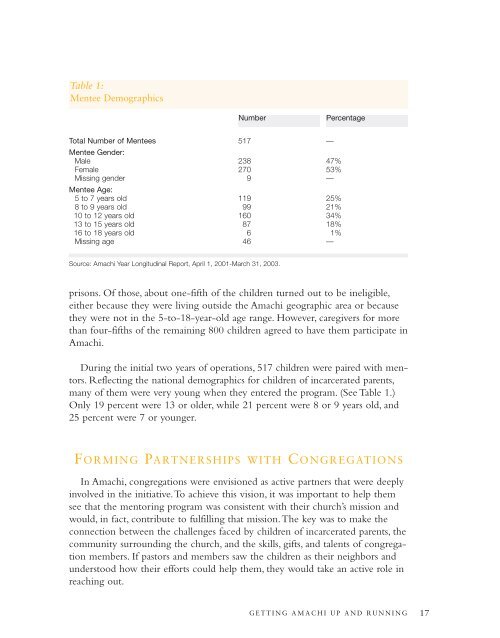Children of Incarcerated Parents
Children of Incarcerated Parents
Children of Incarcerated Parents
You also want an ePaper? Increase the reach of your titles
YUMPU automatically turns print PDFs into web optimized ePapers that Google loves.
Table 1:<br />
Mentee Demographics<br />
Number<br />
Percentage<br />
Total Number <strong>of</strong> Mentees 517 —<br />
Mentee Gender:<br />
Male 238 47%<br />
Female 270 53%<br />
Missing gender 9 —<br />
Mentee Age:<br />
5 to 7 years old 119 25%<br />
8 to 9 years old 99 21%<br />
10 to 12 years old 160 34%<br />
13 to 15 years old 87 18%<br />
16 to 18 years old 6 1%<br />
Missing age 46 —<br />
Source: Amachi Year Longitudinal Report, April 1, 2001-March 31, 2003.<br />
prisons. Of those, about one-fifth <strong>of</strong> the children turned out to be ineligible,<br />
either because they were living outside the Amachi geographic area or because<br />
they were not in the 5-to-18-year-old age range. However, caregivers for more<br />
than four-fifths <strong>of</strong> the remaining 800 children agreed to have them participate in<br />
Amachi.<br />
During the initial two years <strong>of</strong> operations, 517 children were paired with mentors.<br />
Reflecting the national demographics for children <strong>of</strong> incarcerated parents,<br />
many <strong>of</strong> them were very young when they entered the program. (See Table 1.)<br />
Only 19 percent were 13 or older, while 21 percent were 8 or 9 years old, and<br />
25 percent were 7 or younger.<br />
FORMING PARTNERSHIPS WITH CONGREGATIONS<br />
In Amachi, congregations were envisioned as active partners that were deeply<br />
involved in the initiative.To achieve this vision, it was important to help them<br />
see that the mentoring program was consistent with their church’s mission and<br />
would, in fact, contribute to fulfilling that mission.The key was to make the<br />
connection between the challenges faced by children <strong>of</strong> incarcerated parents, the<br />
community surrounding the church, and the skills, gifts, and talents <strong>of</strong> congregation<br />
members. If pastors and members saw the children as their neighbors and<br />
understood how their efforts could help them, they would take an active role in<br />
reaching out.<br />
GETTING AMACHI UP AND RUNNING 17

















